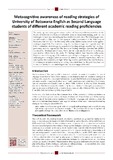Metacognitive awareness of reading strategies of University of Botswana English as Second Language students of different academic reading proficiencies

View/
Date
2013-02-21Author
Magogwe, Joel M.
Publisher
African Online Scientific Information System Open Journals, www.aosis.co.zaType
Published ArticleMetadata
Show full item recordAbstract
This study explored metacognitive awareness level of University of Botswana students in the Faculty of Social Sciences. It also considered the more recent research focusing on the role of metacognitive awareness in reading and how it relates to proficiency. The following questions are addressed: (1) What are the self-reported reading proficiencies of the University of Botswana students? (2) Are the University of Botswana students aware of their metacognitive reading strategies? (3) What kind of metacognitive reading strategies are frequently used? (4) Is there a difference in metacognitive awareness of reading strategies used by high- and low-proficiency students respectively? The Survey of Reading Strategies Questionnaire (SORS) developed by Mokhtari and Sheorey (2002), and the semi-structured interview technique were used to collect data for this study. The findings indicate that University of Botswana English as Second Language (ESL) students reported high reading proficiency and high use of metacognitive strategies, but there was no vast difference in terms of proficiency. Students who reported their proficiency as high had an edge over low-proficiency ones mainly because their management and monitoring of reading was guided more by the goals they have set themselves than by the tests and assignments they were supposed to write.
